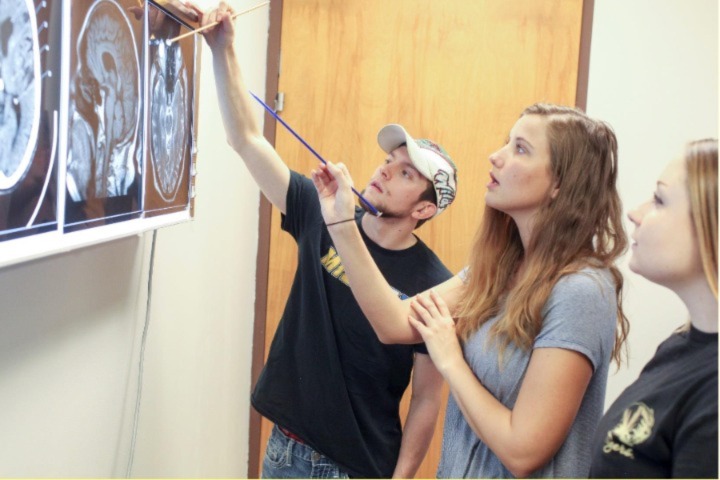What is radiography?
The Mizzou Radiography program equips students with the skills needed to become registered technologists. This essential medical imaging technique captures detailed visuals of the body’s internal structures, playing a vital role in diagnosing and monitoring conditions such as fractures, infections, and diseases affecting organs and tissues. Graduates are fully prepared to sit for the national certification exam.
Don’t just take our word for it. Watch the video below to learn more about a career in radiography.
What classes will I take?
Before entering the clinical phase of the Radiography program, students complete general education requirements and program prerequisites. The program includes a secondary application process, where students must apply and be accepted to proceed to the clinical phase. The clinical phase is 24 months, including summers.
Radiography students receive comprehensive clinical instruction paired with academic coursework. Students also complete advanced coursework in one of the following areas of imaging: CT, MRI, or Cardiac and Vascular Interventional Radiography. All radiography students take classes such as:
- Imaging Modalities
- Radiography Procedures
- Radiation Safety and Biology
- Clinical Education
Are there experiential learning opportunities?
Yes! The University of Missouri believes in learning by doing. The Radiography bachelor’s degree program includes approximately 1,500 hours of clinical experience. Students complete rotations at clinics and hospitals across mid-Missouri – including University of Missouri Hospital, Columbia Orthopedic Group, Moberly Regional Medical Center, and Boone Hospital Center – with some evening and weekend shifts. This immersive training gives students the opportunity to apply classroom knowledge in real-world health care settings, ensuring they graduate with the practical skills needed to succeed as registered technologists.
Become a radiography major
You can pursue a radiography degree at any point in your career at MU. To begin the clinical phase of the radiography program, students must complete a secondary application and receive admission.
- New students: Apply to MU and choose Radiography – Pre Health Sciences as your major.
- Current students: Declare or change your major.
Frequently asked questions
Radiography is ideal for students interested in health care, technology, and playing a crucial role in diagnosing and treating medical conditions. It’s an excellent choice for students who enjoy science, want to work closely with physicians and patients, and are eager to complete advanced coursework in specialty areas of imaging, such as MRI, CT, or Cardiac and Vascular Interventional Radiography.
Radiographers combine technical knowledge with strong interpersonal skills to care for patients and produce high-quality medical imaging. Students who succeed in radiography tend to be detail-oriented, comfortable with technology, compassionate and patient-focused, strong communicators, problem-solvers, and team players.
A bachelor’s degree in Radiography prepares graduates to sit for national examinations by the American Registry of Radiologic Technologists (ARRT). Graduates are also equipped to specialize in areas such as MRI, CT, or Cardiac and Vascular Interventional Radiography.
Mizzou Radiography graduates are also prepared for graduate programs in areas such as education, clinical leadership, radiologist assistant and more!
Note: While successful completion of the degree at the University of Missouri is a key step, it does not guarantee eligibility to take the ARRT certification exam. To sit for the exam, students must also meet the ARRT’s full set of requirements, including its ethics standards. Learn more about ARRT eligibility.
Radiographers work in hospitals, clinics, outpatient centers, and specialty imaging facilities. They are often part of fast-paced environments providing imaging guidance in the operating room, emergency room, and urgent care clinics. Depending on the setting, radiographers may even assist in imaging procedures in morgues or veterinary hospitals.
The field of medical imaging is growing quickly, with high demand for trained professionals across the country. According to the U.S. Bureau of Labor Statistics, the median annual salary for radiologic technologists was $76,020 in 2023.
Mizzou’s Radiography degree prepares you for your future by providing extensive hands-on training through clinical rotations in local clinics.
This program has a secondary application. Students typically apply to the clinical phase of the program during their sophomore year. Learn more about the Radiography secondary application process.
The program is competitive with an average of 40+ students applying. The program accepts up to 20 students each year.
In addition to the University tuition and fees, room and board, and personal expenses, a Radiography student will have additional costs associated with the program. View Radiography program costs.
After being accepted into the clinical phase of the program, but before starting clinical rotations, students must meet specific eligibility requirements, which are set by our clinical partners. These may include negative criminal background checks, immunizations and health screenings, and negative drug testing (including testing for marijuana metabolites). All requirements must be met to participate in clinical experiences, which are a required part of the program.
Learn more about clinical eligibility requirements. Find other program policies in the current Radiography student handbook.
Program accreditation
The Mizzou Radiography program is fully accredited by:
The Joint Review Committee on Education in Radiologic Technology
20 North Wacker Drive, Suite 2850
Chicago, Illinois 60606-3182
312-704-5300
mail@jrcert.org
The program’s current award is five years. View general program accreditation information and the current accreditation award letter.
- Assessment of learning and program effectiveness data
- Current program effectiveness data
- Program mission, vision and goals
Institutional accreditation
University of Missouri Institutional Accreditation is provided by
The Higher Learning Commission
30 North LaSalle Street, Suite 2400
Chicago, IL 60602-2504
(800) 621-7440
See the University of Missouri Provost’s Office website for professional licensure disclosure information.
